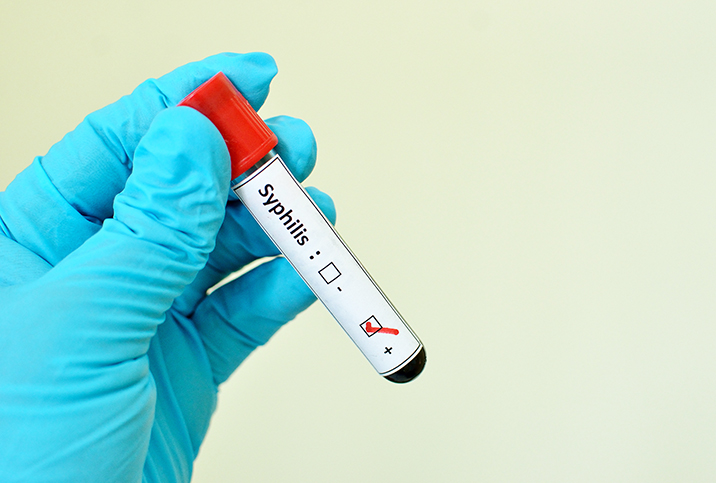What Happens If You Don't Treat Syphilis in the First Stages?

Everyone has heard of syphilis, but most people don't know it's the last stage of the infection that can do permanent damage to your body. Prevention or early detection and treatment can keep you safe.
A medical overview
Syphilis is a bacterial infection and sexually transmitted disease (STD) that affected 129,813 Americans in 2019. Spread through contact with an open sore, syphilis is most often passed through vaginal, anal or oral sex. Risk factors include unprotected sex or multiple sexual partners, being a sex worker, drug use, sharing sex toys, having other STDs or being an immunocompromised individual. Men who have sex with men are at a higher risk.
Symptoms usually occur in stages, beginning with painless sores and progressing to a spreading rash and flu-like symptoms. Left untreated, syphilis can pose a serious, potentially life-threatening risk. Children of infected mothers can contract the infection during gestation or childbirth, and if transmitted/infected it may lead to/manifest as a rash, deafness, teeth abnormalities and saddle nose.
Additionally, syphilis can cause premature birth, stillbirth or death of the child soon after birth.
The three stages
First stage syphilis is characterized by a painless sore on the genitals, rectum and/or mouth about three weeks after infection. The sore(s) will heal in three to six weeks and may go unnoticed.
Several weeks later, the second stage may manifest and is often marked by a typically non-itchy rash that moves outward from the trunk to the limbs. Notably, it usually covers the palms and the soles of the feet, a characteristic sign. This stage can involve fever, patchy hair loss, muscle aches, sore throat and wart-like sores on the genitals and mouth.
Secondary stage symptoms tend to come and go for up to a year or more before the infection moves into the silent latent phase, during which the individual is asymptomatic. If the infection reaches this point, the individual is likely unaware of their status and unlikely to become aware unless tested. The infection can live dormant in the body for years and return in the third stage.
Early syphilis (in the first, second or early latent stages) can be treated easily, often with a single intramuscular injection of the antibiotic Benzathine penicillin.
The complications of tertiary syphilis
Late stage, or tertiary, syphilis is significantly more dangerous. It typically begins 10 to 30 years after infection and can damage a number of internal organs, including the heart and blood vessels, brain and nervous system, joints, bones and liver. Syphilis in the nervous system (neurosyphilis) can cause all kinds of problems, from headaches to stiff neck, numbness, altered behavior, memory and sensory problems, gradual blindness or seizures, stroke-like symptoms and paralysis. Syphilis can still be cured in the late stage, but any damage done to the body by then is irreversible.
Not everyone with latent syphilis will develop tertiary syphilis—only around 30 percent of those who aren't treated will progress to the tertiary phase, and fortunately, syphilis-related death is rare for adults in the U.S. today. Still, babies born to mothers with untreated syphilis face infant death rates as high as 40 percent.
Prevention and detection
The obvious and best way of prevention is not to have sex with an infected person, although it must be acknowledged that abstinence isn't the most practical advice for everyone. Beyond abstinence, latex condom use is the best way to prevent all STDs, although condoms are only effective in preventing the spread of syphilis if they cover the affected sores. In general, though, latex condoms are very effective when used correctly and regularly for preventing STDS.
Minimizing your number of partners can also reduce risk. And having an open and honest discussion/relationship with your partners is very important as well.
Avoid recreational drugs, as drug use is often linked to riskier behavior that increases the chances of contracting STDs.
Get tested regularly: All sexually active adults should talk to their doctor about testing recommendations. Pregnant women should be tested for syphilis as well as HIV, hepatitis B and other STDs early on in pregnancy. If you test positive, get treated right away, and tell your partners to get tested immediately and start treatment.
Syphilis was becoming less common, but there has been an unfortunate recent uptick over the past two decades. In 2001 and 2002, reported cases of syphilis were around 2.1 per 100,000 people. Over the years since then, the number of cases has risen each year, and in 2018, there were 10.8 cases of syphilis per 100,000 people.
Yes, syphilis is like any other STD, and it's curable with timely antibiotic treatment. However, symptoms can easily go unnoticed, and that can mean the disease progresses to the tertiary stage, with potentially devastating results.
Reduce your risk, practice safe sex, get tested and keep an eye out for any symptoms.


















